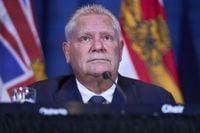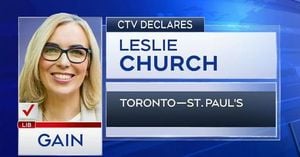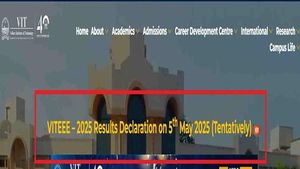Ontario Premier Doug Ford is rallying Canadians to unite against U.S. President Donald Trump’s recent annexation threats, urging them to "fight like we’ve never fought before." Speaking at The Valuing Reconciliation in Global Markets Conference in Toronto on April 28, 2025, Ford emphasized that the uncertainty stemming from Trump’s remarks is detrimental to workers and businesses across Canada.
"Folks, we have two choices here as a collective country," he stated. "We either all band together and support each other or we sit back and get rolled over by President Trump with a cement mixer. That’s option one. Option two, we all fight like we’ve never fought before. I take option two. We will never roll over. We will never, ever be the 51st state, and I can tell you, Canada will never be for sale." Ford’s remarks came shortly after Trump took to Truth Social, reiterating his desire for Canada to join the U.S. as its 51st state.
In his post, Trump wished Canadians good luck as they head to the polls to elect a new prime minister, proposing that if Canada were to join the U.S., it could enjoy significant economic benefits. "Elect the man who has the strength and wisdom to cut your taxes in half, increase your military power, for free, to the highest level in the World, have your Car, Steel, Aluminum, Lumber, Energy, and all other businesses, QUADRUPLE in size, WITH ZERO TARIFFS OR TAXES," he wrote.
Trump’s message also suggested that Canada has been receiving substantial financial support from the U.S. for years. "America can no longer subsidize Canada with the Hundreds of Billions of Dollars a year that we have been spending in the past. It makes no sense unless Canada is a State!" Ford has been vocal about the economic chaos caused by Trump’s tariffs and threats, stating, "Nothing is worse than uncertainty… there is one person that is causing these problems."
Ford’s political maneuvering comes as he has been a prominent figure on U.S. television, consistently opposing Trump's trade policies and annexation threats. His approach has been characterized by a blend of assertive nationalism and pragmatism, reminiscent of a bygone era in American politics where politicians were more ideologically flexible. Earlier this year, Ford called for a snap election, leading his Progressive Conservative party to a decisive victory.
During his campaign, Ford donned a blue "Canada Is Not For Sale" cap, reminiscent of Trump’s MAGA hats, and even threatened to cut off power to American households as part of his strategy to assert Canada’s sovereignty. His efforts to position himself as a defender of Canadian interests have made him a familiar face on both sides of the border, especially in the lead-up to the federal elections.
In a recent conversation, Ford expressed disappointment in how Conservative leader Pierre Poilievre has campaigned, particularly in light of the looming threat posed by Trump. "I think it started that way," Ford remarked, referring to Trump’s comments about Canada, suggesting that they were initially aimed at undermining former Prime Minister Justin Trudeau.
Ford has also been actively promoting his "Fortress Am-Can" plan, which aims to strengthen the economic and military alliance between Canada and the U.S. against common threats, particularly from China. He believes that this approach is crucial for the future of both nations, stating, "We have to keep an eye on China, and it’s come to fruition." However, he lamented that he has not yet had the opportunity to pitch this plan directly to Trump.
As the Canadian election approaches, Ford predicts a likely minority government, highlighting the unusual political climate where the threat of Trump has elevated the two major parties while marginalizing minor parties. He noted that the upcoming elections feel unprecedented, with no one anticipating the current political landscape just a few months ago.
Ford has also voiced concerns about the potential for secession movements in Alberta, particularly in light of Trump’s interest in Canada’s natural resources. He fears that if Trump were to become aware of such sentiments, it could exacerbate tensions between the two nations. "I think it will be. We’re a little worried here in Ontario," he said, emphasizing the need for unity between provinces.
In discussions about the future of U.S.-Canada relations, Ford stressed the importance of meeting NATO commitments and enhancing military cooperation. He believes that Canada must increase its defense spending to 2% of GDP and is optimistic about the potential for improved relations with the U.S. under a new prime minister.
Reflecting on his own political strategy, Ford asserted that if he were leading the Conservative party, he would have pivoted towards a more aggressive stance against Trump’s encroachment on Canadian sovereignty. "I’d have a deal within a month of the day I got elected," he declared, emphasizing the need for a proactive approach in dealing with U.S. demands.
Ford’s candid observations about the current political landscape reveal a deep understanding of the complexities involved in Canadian politics, particularly in the face of external pressures from the U.S. He has made it clear that the stakes are high, both for Canada’s sovereignty and its economic future. As the election unfolds, Ford’s call for unity and resilience resonates with many Canadians facing uncertainty in a rapidly changing political environment.




